Search the Special Collections and Archives Portal
Search Results
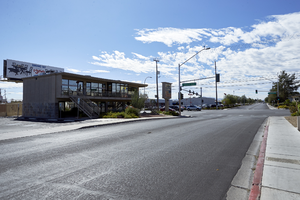
Stand alone building on Burnham Avenue at East Sahara Avenue looking south, Las Vegas, Nevada: digital photograph
Date
2017-09-13
Archival Collection
Description
A stand alone building sits on the corner of East Sahara Avenue and Burnham Avenue.
Image
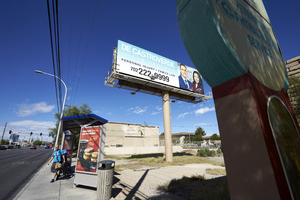
Billboard and bus stop on East Sahara Avenue looking west, Las Vegas, Nevada: digital photograph
Date
2017-09-13
Archival Collection
Description
Situated in a vacant lot, a billboard rises above an RTC Sahara Express bus stop on East Sahara Avenue at Mariposa Avenue.
Image
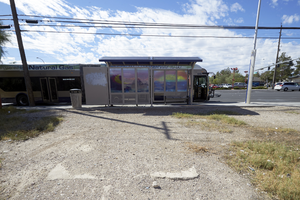
Bus stop on East Sahara Avenue looking south from vacant lot, Las Vegas, Nevada: digital photograph
Date
2017-09-13
Archival Collection
Description
An RTC Sahara Express bus stop sits in front of a vacant lot on East Sahara Avenue near Mariposa Avenue.
Image
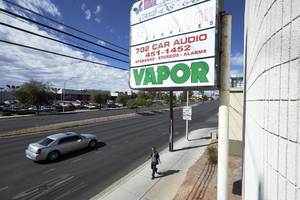
A man walking on a sidewalk beneath a sign on East Sahara Avenue looking southwest, Las Vegas, Nevada: digital photograph
Date
2017-09-13
Archival Collection
Description
A man passes on the sidewalk beneath a sign advertising businesses on East Sahara Avenue east of Burnham Avenue.
Image
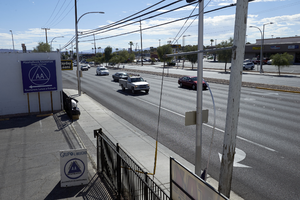
Traffic on East Sahara Avenue near Burnham Avenue looking southeast, Las Vegas, Nevada: digital photograph
Date
2017-09-13
Archival Collection
Description
Traffic passes by businesses on East Sahara Avenue east of Burnham Avenue.
Image
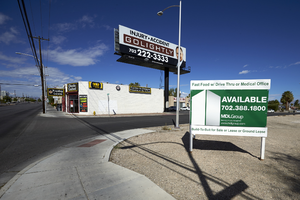
Signs on vacant lot on East Sahara Avenue at San Jose Avenue looking west, Las Vegas, Nevada: digital photograph
Date
2017-09-13
Archival Collection
Description
Undeveloped land on the northeast corner of East Sahara Avenue and San Jose Avenue.
Image
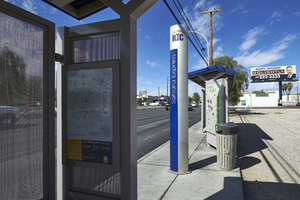
Bus stop near vacant lot on East Sahara Avenue at San Jose Avenue looking west, Las Vegas, Nevada: digital photograph
Date
2017-09-13
Archival Collection
Description
An RTC Sahara Express bus stop sits in front of undeveloped land on the northeast corner of East Sahara Avenue and San Jose Avenue.
Image
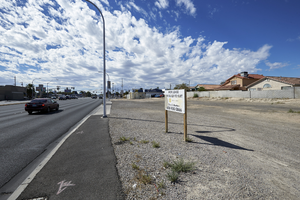
Vacant land on South Eastern Avenue north of East Sahara Avenue looking south, Las Vegas, Nevada: digital photograph
Date
2017-09-13
Archival Collection
Description
Single family homes butt up against an undeveloped parcel of land on South Eastern Avenue north of East Sahara Avenue.
Image
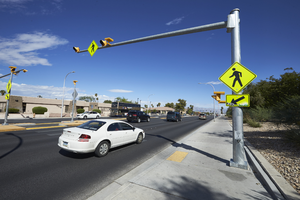
A crosswalk signal on South Eastern Avenue north of East Sahara Avenue looking north, Las Vegas, Nevada: digital photograph
Date
2017-09-13
Archival Collection
Description
A crosswalk signal on South Eastern Avenue north of East Sahara Avenue.
Image
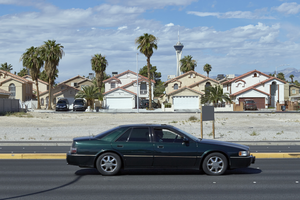
Homes on Stockton Avenue and vacant land on South Eastern Avenue north of East Sahara Avenue looking west, Las Vegas, Nevada: digital photograph
Date
2017-09-13
Archival Collection
Description
Single family homes on Stockton Avenue are seen behind an undeveloped parcel of land on South Eastern Avenue north of East Sahara Avenue as traffic flows by.
Image
Pagination
Refine my results
Content Type
Creator or Contributor
Subject
Archival Collection
Digital Project
Resource Type
Year
Material Type
Place
Language
Records Classification
